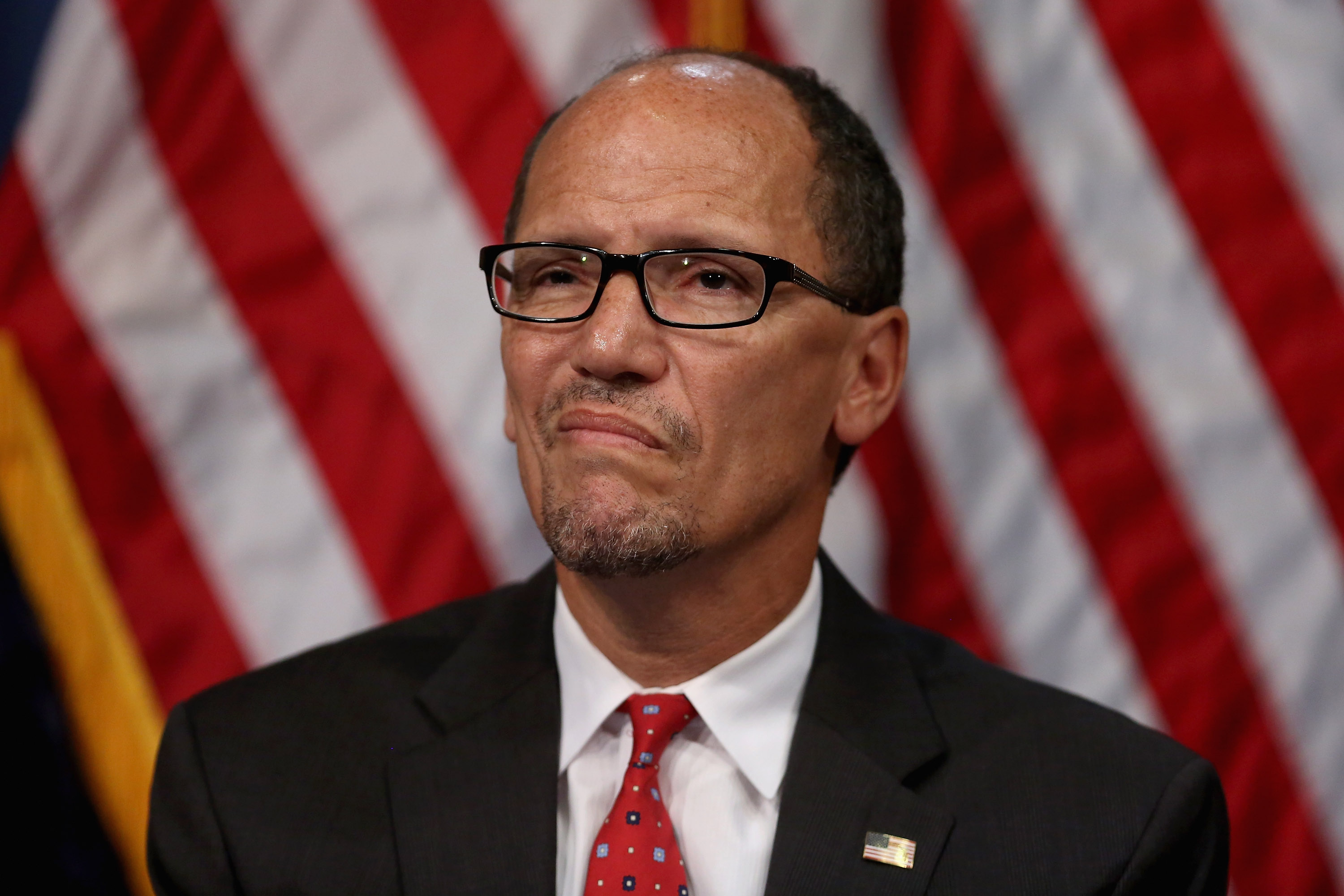Why Tom Perez can't be trusted to run the Democratic Party
He's a stalking horse for the failed Democratic Party establishment


The Democratic Party's big political question right now is how best to harness the incredible anti-Trump energy among left-leaning Americans. Roughly speaking, the base wants a ferocious fight against President Trump, coupled to a strong program of social justice and left populism. The establishment, by contrast, wants a meager sprinkling of that program, but only insofar as it does not alienate the donor class.
That brings me to the upcoming election for leader of the Democratic National Committee. The two leading candidates are Tom Perez, secretary of labor under Obama and establishment team player; and Keith Ellison, a congressman from Minnesota and leading representative of the party's Bernie Sanders wing.
Superficially, the two have quite similar politics. But in practice, it's quite obvious that Perez is basically a sock puppet for the establishment and the donor class. This makes him unsuited to conduct the political overhaul necessary to get the party back in fighting shape.
The Week
Escape your echo chamber. Get the facts behind the news, plus analysis from multiple perspectives.

Sign up for The Week's Free Newsletters
From our morning news briefing to a weekly Good News Newsletter, get the best of The Week delivered directly to your inbox.
From our morning news briefing to a weekly Good News Newsletter, get the best of The Week delivered directly to your inbox.
It was clear from the start that Perez was pushed into the race by Obama/Clinton forces, to keep the party machinery in their own hands. But more telling evidence came this week, when Perez slipped up and admitted the obvious, that the 2016 Democratic primary election was heavily slanted towards Hillary Clinton. "We heard loudly and clearly yesterday from Bernie supporters that the process was rigged and it was. And you've got to be honest about it. That's why we need a chair who is transparent," he said.
Perez was unquestionably right about this. The admitted, overt purpose of superdelegates, for example, is to allow party elites to partially overturn the will of primary voters if they see fit. Now, Bernie Sanders did benefit from other dubiously democratic aspects of the primary system, like the bizarre caucus system in some states, and it's probably true that in a scrupulously fair open primary he still would have lost. But it's also obvious that party elites have a hugely outsize sway over the primary process, and they connived from the start to clear the decks for Clinton. Whole books are written about this process.
So was this a signal that Perez might not be so deeply in the establishment's pocket after all? No. When his backers in the establishment got mad at him, Perez quickly backtracked:
Hillary Clinton supporters often point out that she won the popular vote, thus demonstrating the party's general popularity. That is true, though in a hypothetical popular vote election both candidates would have run a different election campaign. But more importantly, the party downballot is a smoking crater, in the worst shape since 1928. The Obama presidency has been a slow-motion collapse of the party at all levels.
A free daily email with the biggest news stories of the day – and the best features from TheWeek.com
To rebuild, Democrats obviously need to start winning some elections, particularly the 2018 midterms, which could set the stage for a 2020 victory at the state level when redistricting happens again. The most reliably left-wing (and the most anti-Trump) demographic in the country at the moment is young people. But young people often don't vote in midterms, so the party must try to convince them to turn out. Sanders inspired tremendous enthusiasm among this group with his calls for universal Medicare, tuition-free college, repealing Citizens United, fighting police brutality, and so on.
But that sort of agenda would require huge increases in taxation on entrenched power and the rich. It is thus squarely at odds with the class interest of the donors Clinton spent half her campaign huddled with (not to mention the business titan Barack Obama has been kitesurfing with since Trump took power). What's more, it would represent a sharp diminution of their own power within the party as an institution, which elites virtually always resist even at the cost of hurting the institution itself. As John Kenneth Galbraith has said, "People of privilege almost always prefer to risk...total destruction, rather than surrender any part of their privileges."
But if the Democrats are to mount an angry populist assault on President Trump and the Republican Party, they can't have a leader whose leash is attached to the hands of the people who got them into this mess in the first place.
Ryan Cooper is a national correspondent at TheWeek.com. His work has appeared in the Washington Monthly, The New Republic, and the Washington Post.
-
 What have Trump’s Mar-a-Lago summits achieved?
What have Trump’s Mar-a-Lago summits achieved?Today’s big question Zelenskyy and Netanyahu meet the president in his Palm Beach ‘Winter White House’
-
 The most anticipated movies of 2026
The most anticipated movies of 2026The Week Recommends If the trailers are anything to go by, film buffs are in for a treat
-
 The biggest viral moments of 2025
The biggest viral moments of 2025In the Spotlight From the Coldplay concert kiss cam to a celebrity space mission, these are some of the craziest, and most unexpected, things to happen this year
-
 Bari Weiss’ ‘60 Minutes’ scandal is about more than one report
Bari Weiss’ ‘60 Minutes’ scandal is about more than one reportIN THE SPOTLIGHT By blocking an approved segment on a controversial prison holding US deportees in El Salvador, the editor-in-chief of CBS News has become the main story
-
 Has Zohran Mamdani shown the Democrats how to win again?
Has Zohran Mamdani shown the Democrats how to win again?Today’s Big Question New York City mayoral election touted as victory for left-wing populists but moderate centrist wins elsewhere present more complex path for Democratic Party
-
 Millions turn out for anti-Trump ‘No Kings’ rallies
Millions turn out for anti-Trump ‘No Kings’ ralliesSpeed Read An estimated 7 million people participated, 2 million more than at the first ‘No Kings’ protest in June
-
 Ghislaine Maxwell: angling for a Trump pardon
Ghislaine Maxwell: angling for a Trump pardonTalking Point Convicted sex trafficker's testimony could shed new light on president's links to Jeffrey Epstein
-
 The last words and final moments of 40 presidents
The last words and final moments of 40 presidentsThe Explainer Some are eloquent quotes worthy of the holders of the highest office in the nation, and others... aren't
-
 The JFK files: the truth at last?
The JFK files: the truth at last?In The Spotlight More than 64,000 previously classified documents relating the 1963 assassination of John F. Kennedy have been released by the Trump administration
-
 'Seriously, not literally': how should the world take Donald Trump?
'Seriously, not literally': how should the world take Donald Trump?Today's big question White House rhetoric and reality look likely to become increasingly blurred
-
 Will Trump's 'madman' strategy pay off?
Will Trump's 'madman' strategy pay off?Today's Big Question Incoming US president likes to seem unpredictable but, this time round, world leaders could be wise to his playbook
